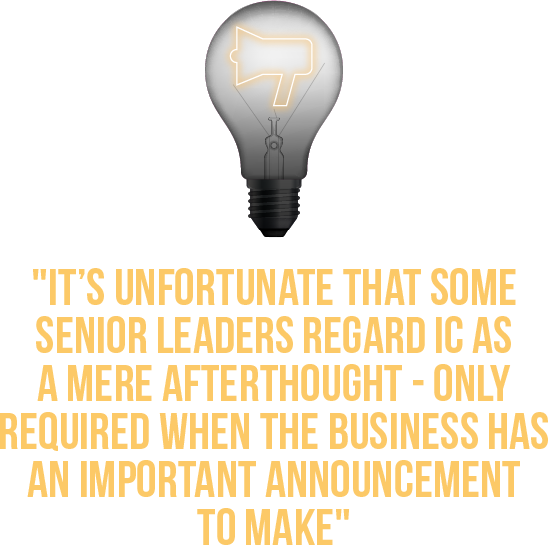
This post is brought to you courtesy of communications connoisseur Amit Joshi, who’s keen to lay down the importance of senior leaders investing in and engaging with internal comms once and for all…
Internal communication is a vital business function, and throughout my career I have championed the need for IC professionals to have a seat at the top table. We have all come across senior leaders who are astutely switched on about how internal comms can positively impact the business and workforce. On the other hand, there are those leaders who unfortunately regard IC as a mere afterthought – only required when the business has an important announcement to make.

Before we dive in, did you know you could be receiving an exciting dollop of IC inspiration like this every week?
Subscribe to our Friday Ketchup to get handpicked internal comms and employee engagement insights, facts, and ideas squeezed straight into your inbox, every Friday.
Why internal comms needs switched-on Senior Leaders
According to research by Aon Hewitt, senior leaders are now more important than ever when it comes to employee engagement, ranking 3rd in the list of Global Engagement Opportunities (now ahead of Managers, who rank 7th). In addition, 64% of internal comms professionals say that barriers such as organisational hierarchies and bureaucracy strongly affect the effectiveness of IC (research by Ellwood Atfield).
 With this in mind, it’s critical that senior leaders understand the real value that internal communications bring to an organisation, and include it as core component of their wider business, marketing and communications strategy. Moreover, senior leaders should ensure that their internal comms managers have sight of this strategy and the objectives associated with it, so they have a clear understanding of how to integrate IC into these strategies, for successful results.
With this in mind, it’s critical that senior leaders understand the real value that internal communications bring to an organisation, and include it as core component of their wider business, marketing and communications strategy. Moreover, senior leaders should ensure that their internal comms managers have sight of this strategy and the objectives associated with it, so they have a clear understanding of how to integrate IC into these strategies, for successful results.
Let’s look at one of the most fundamental, and rewarding, benefits of senior leaders engaging with internal comms – happy and confident employees who understand the direction the business is going in and are aware of the value of the contributions they’re making towards the business goals.
To achieve this, internal communicators and senior leaders must work with each other to establish the best course of action for engaging employees with relevant, valuable, and consistent communications. There’s nothing worse than receiving a bog-standard general internal comms campaign that is not relevant to you or your team.
Understand, Empower, Enable
 When it comes to successful internal communication, the senior leader’s ultimate responsibility should be to understand, empower and enable their internal comms team to keep employees informed and motivated.
When it comes to successful internal communication, the senior leader’s ultimate responsibility should be to understand, empower and enable their internal comms team to keep employees informed and motivated.
From my perspective and experience, truly effective internal comms can only be achieved when senior leaders start giving IC professionals a seat at the top table, so they can have their say on the employee engagement strategy and put their expertise to good use.
Only at this point will senior leaders truly understand, empower and enable effective, impactful and measurable internal comms.
Meet the author

Amit Joshi
Amit Joshi is a communications professional with over 12 years’ experience across a variety of business sectors and government in the UK and the MENA region. He helps
organisations to enhance their internal and external communications by identifying and defining communications priorities, and developing integrated communications strategies that are aligned to the business objectives.
Get in touch today to find out how we could help you transform your leaders and managers from average, to exceptional!
Got a brilliant idea you simply can’t keep to yourself?
We’re always looking for fresh faces to help us further the IC conversation by writing guest articles for our blog. If you want to make your voice heard on internal comms, employee engagement, change management or leadership development, we’d love it if you got in touch!












